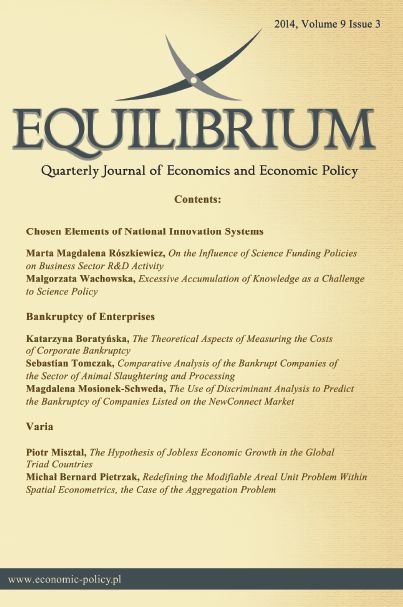On the Influence of Science Funding Policies on Business Sector R&D Activity
DOI:
https://doi.org/10.12775/EQUIL.2014.015Keywords
science policy effectiveness, direct and indirect fundingAbstract
The analysis focuses on assessing the impact of science and innovation policy on increasing business research activity, represented by the measure of business expenditure on research (BERD). The study concentrates on the impact of direct and indirect funding instruments. The effects of public intervention were examined basing on the pursued policy and the country’s level of innovativeness in 21 countries. In order to build aggregate variables of direct and indirect financial flows, the procedure of principal components was performed. Correlations between these variables and business sector activity were examined. The procedure of hierarchical clustering allowed to determine groups of countries which used similar policy instruments and experienced the same dynamics of BERD expenditures. The aim of such clustering was to highlight basic types of relations between the policy pursued and the activity of business sector. The study allowed to determine that direct funding has a significant effect on increasing BERD expenditures and is decreasing with the growing intensity of these outlays. The relation for indirect funding was found to be more complex. The generosity of country’s tax incentives for R&D was proved to be dependent on the level of innovativeness of business sector and was represented by an inverted U-shaped curve. The level of innovativeness was also found to have a stronger impact on business sector research activity than the policy pursued by a country. Basic recommendations on research funding policies were built based on the performed analysis.References
Arrow K. J. (1962), Economic Welfare and the Allocation of Resources to Invention [in:] R.R. Nelson (ed.), The Rate and Direction of Economic Activity, Princeton University Press, New York.
Bloom N., Griffith R. (2001), The Internationalization of UK R&D, “Fiscal Studies”, Vol. 22, No. 3.
European Commission (2010), Europe 2020 – A European strategy for smart, sustainable and inclusive growth. Communication from the Commission, European Commission, Brussels.
Falk M. (2004), What Drives Business R&D across OECD Countries?, Working paper, Austrian Institute of Economic Research, Vienna.
Goldberg I., Goddard J.G., Kuriakose S., Racine J.L. (2011), Igniting Innovation: Rethinking the Role of Government in Emerging Europe and Central Asia, The World Bank, Washington DC.
Griliches Z. (1979), Sibling Models and Data in Economics: Beginnings of a Survey, “Journal of Political Economy”, Vol. 87, No.5, http://dx.doi.org/10.1086/260822 .
Guellec D., van Pottelsberghe de la Potterie B. (2003), The Impact of Public R&D Expenditure on Business R&D, “Economics of Innovation and New Technology”, Vol. 12, No. 3, http://dx.doi.org/10.1787/670385851815 .
Howitt P. (2000), Endogenous Growth and Cross‐Country Income Differences, “American Economic Review”, Vol. 90, No. 4, http://dx.doi.org/10.1257/aer. 90.4.829.
Jones B. F. (2011), As science evolves, how can science policy?, National Bureau of Economic Research.
Jones C., Williams J. (1998), Measuring the Social return to R&D, “Quarterly Journal of Economics”, Vol. 113, No. 4, http://dx.doi.org/10.1162/003355398555856.
OECD (2011), The international experience with R&D tax incentives, http://www.finance.senate.gov/imo/media/doc/OECD%20SFC%20Hearing%20testimony%209%2020%2011.pdf
Moen J. (2007), Should Finland introduce an R&D tax credit? Reflections based on experience with Norwegian R&D policy, The Research Institute of the Finnish Economy, Discussion paper no. 1097, Helsinki.
Policy instruments for sustainable innovation (2004), Technopolis, Amsterdam.
Romer P. (1990), Endogenous Technological Change, “Journal of Political Economy”, Vol. 98, No. 5, http://dx.doi.org/10.1086/261725.
Saplolsky H. M, Taylor M. Z. (2011), Politics and the Science of Science Policy [in:] Fealing K.H., Lane J.I., Marburger III J.H., Shipp S.S. (ed.), The Science of Science Policy, Stanford Business Books, Stanford.
Stewart L.A., Warda J., Atkinson R. D. (2012), We’re #27!: The United States Lags Far Behind in R&D Tax Incentive Generosity, The Information Technology and Innovation Foundation.
Tewksbury J.G., Crandall M.S., Crane W.E. (1980), Measuring the Societal Benefits of Innovation, “Science”, Vol. 209, No. 4457, http://dx.doi.org/10.1126/science.209.4457.658.
Warda, J. (2001), Measuring the Value of R&D Tax Treatment in OECD Countries, “STI Review”, Vol. 27, Special Issue on New Science and Technology Indicators.
Downloads
Published
How to Cite
Issue
Section
Stats
Number of views and downloads: 534
Number of citations: 0



